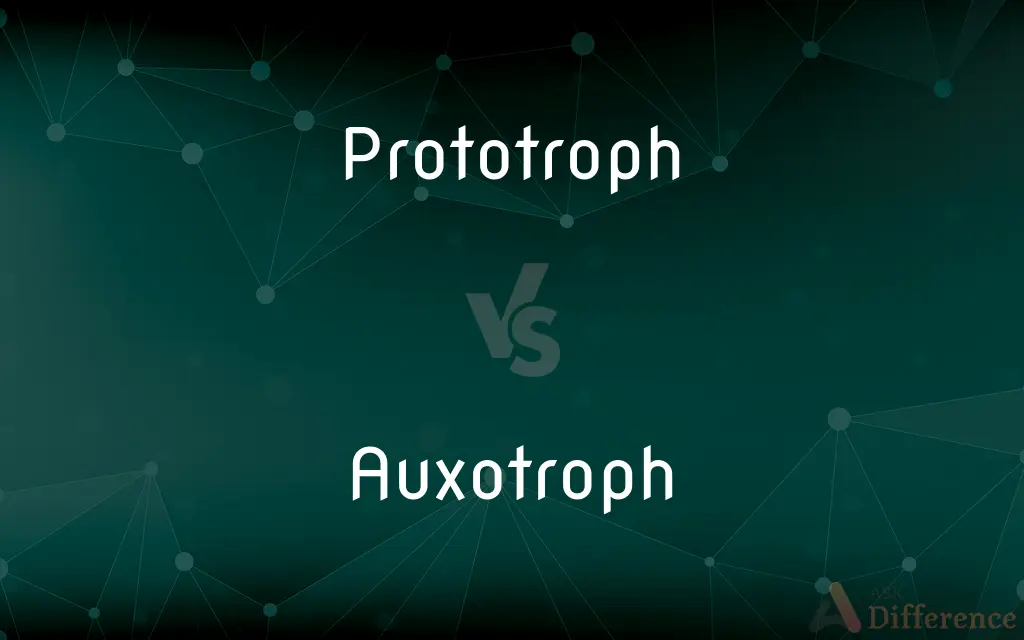Prototroph vs. Auxotroph — What's the Difference?
By Tayyaba Rehman — Updated on September 18, 2023
Prototrophs are microorganisms that can synthesize all essential compounds and thus can grow in minimal media. Auxotrophs are mutants that lack the ability to synthesize one or more essential compounds, requiring supplemented media for growth.

Difference Between Prototroph and Auxotroph
Table of Contents
ADVERTISEMENT
Key Differences
Prototrophs are microorganisms that have the metabolic capability to synthesize all compounds essential for their growth. They can grow and reproduce in a minimal medium that provides only basic nutrients. Auxotrophs, conversely, are unable to synthesize one or more essential compounds, due to mutations that affect metabolic pathways.
Prototrophs are typically the wild-type strains of microorganisms, meaning they represent the naturally occurring form. Auxotrophs are often mutant strains of these wild-type organisms, displaying a deficiency in synthesizing a particular nutrient or compound. While prototrophs flourish in minimal environments, auxotrophs require a supplemented medium to grow.
Both terms are extensively used in the field of microbiology and genetics, particularly for studying mutations and gene function. Prototrophs are useful as controls or as a reference for studying mutations, while auxotrophs are commonly employed to investigate specific metabolic pathways and to create defined conditions for experiments.
From a grammatical standpoint, "Prototroph" and "Auxotroph" are both nouns and are used specifically in biological contexts. Prototrophs are often used in bioengineering and biotechnology for producing compounds in a controlled environment. Auxotrophs, on the other hand, are commonly used in research to understand metabolic deficiencies and to test the effects of supplemented nutrients.
Comparison Chart
Nutritional Requirement
Can grow in minimal media
Requires supplemented media
ADVERTISEMENT
Origin
Usually wild-type strains
Usually mutant strains
Utility
Controls, bioengineering
Research, metabolic studies
Field of Study
Microbiology, Genetics
Microbiology, Genetics
Part of Speech
Noun
Noun
Compare with Definitions
Prototroph
A microbial strain used as a control in biological experiments.
We used a prototroph as the control group in our study.
Auxotroph
A microorganism unable to synthesize essential compounds, requiring a supplemented medium.
The auxotroph could only grow when amino acids were added to the medium.
Prototroph
A self-sustaining organism in terms of nutritional requirements.
Prototrophs are ideal for bioengineering applications.
Auxotroph
A mutant strain that lacks specific biosynthetic pathways.
This auxotroph lacks the pathway for tryptophan synthesis.
Prototroph
The wild-type form of a microorganism that requires only minimal nutrients.
As a prototroph, the bacteria did not need extra amino acids.
Auxotroph
An organism used in research to investigate metabolic deficiencies.
We used an auxotroph to study the role of specific genes in metabolism.
Prototroph
A microorganism capable of synthesizing all essential compounds for growth.
The prototroph could grow well on a minimal agar plate.
Auxotroph
A genetically modified organism with specific nutrient requirements.
The auxotroph has been modified to require additional sugars.
Prototroph
A microorganism that can grow in the absence of specific nutrients.
The prototroph continued to grow despite the sparse conditions.
Auxotroph
A microorganism requiring additional nutrients for growth.
The auxotroph couldn't grow without supplemented vitamins.
Prototroph
A prototrophic microorganism.
Auxotroph
A mutant organism (especially a bacterium or fungus) that requires a particular additional nutrient which the normal strain does not.
Prototroph
Having the same metabolic capabilities and nutritional requirements as the wild type parent strain
Prototrophic bacteria.
Auxotroph
An organism, such as a strain of bacteria, that has lost the ability to synthesize certain substances required for its growth and metabolism as the result of mutational changes.
Prototroph
(biology) Any microorganism that can synthesize its nutrients from inorganic material
Auxotroph
Any microorganism that has lost the ability to synthesize an organic compound required for its growth, usually as a result of mutation
Common Curiosities
How are Prototrophs used in research?
Prototrophs often serve as controls or for bioengineering applications.
What is a Prototroph?
A Prototroph is a microorganism that can grow in minimal media because it can synthesize all necessary nutrients.
Can Prototrophs become Auxotrophs?
Yes, through mutations affecting biosynthetic pathways.
Are Prototrophs autotrophic?
Not necessarily, as they may still require organic carbon sources.
Are Prototrophs wild-type?
Generally, yes. Prototrophs are usually the wild-type form of an organism.
What is an Auxotroph?
An Auxotroph is a mutant microorganism that requires supplemented media for growth due to an inability to synthesize certain nutrients.
Are Auxotrophs mutants?
Yes, Auxotrophs are usually mutants that have lost specific biosynthetic pathways.
What does a Prototroph need to grow?
Minimal media with basic nutrients.
Are Prototrophs always bacteria?
No, they can also be yeast, fungi, or other microorganisms.
How are Auxotrophs used in research?
Auxotrophs are used to study metabolic pathways and gene functions.
What does an Auxotroph need to grow?
A supplemented medium containing the nutrients it can't synthesize.
Do Auxotrophs have utility in biotechnology?
Yes, they are often used in metabolic engineering and research.
Are both terms nouns?
Yes, both "Prototroph" and "Auxotroph" are nouns.
Can Prototrophs be created artificially?
Generally, they are the natural, wild-type form but can be maintained or modified.
Can Auxotrophs be reverted back to Prototrophs?
Potentially, through genetic reversion or engineering.
Share Your Discovery

Previous Comparison
Taxon vs. Taxonomy
Next Comparison
Stitch vs. SutureAuthor Spotlight
Written by
Tayyaba RehmanTayyaba Rehman is a distinguished writer, currently serving as a primary contributor to askdifference.com. As a researcher in semantics and etymology, Tayyaba's passion for the complexity of languages and their distinctions has found a perfect home on the platform. Tayyaba delves into the intricacies of language, distinguishing between commonly confused words and phrases, thereby providing clarity for readers worldwide.















































